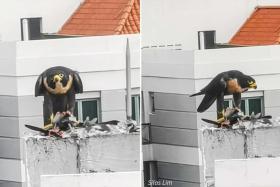HDB shops get upgrade
HDB's Revitalisation Of Shops - ROS - scheme gives neighbourhood shops in Jurong West new lease of life
He used to see fewer than five customers a week, but after upgrading his shop through the Housing Board's Revitalisation Of Shops (ROS) scheme, he now sees about 20 people weekly.
Mr Chen Wing Fatt Michael, 60, owner of interior design shop Hwa Li Design, is one of the many retailers in Singapore who has benefitted from the ROS programme.
Under the ROS scheme, shops in Jurong West enjoyed co-funding for upgrading works in their common corridors in 2014.
This included new lighted signboards, new flooring and awnings.
Retailers also enjoyed co-funding for promotional events organised in the precinct, which helped to attract more crowds.
Two weeks ago, HDB announced an enhanced ROS scheme that included an adjustment to the co-funding ratio between retailers and the Government. (See report at right.)
Mr Chen, who has rented the shop for about 18 years, said his landlord paid about $7,000 for the ROS upgrading works.
His rental was $4,000 per month when he first started. He now pays $6,000.
He told The New Paper: "After the upgrading, I can't say that everyone's business has improved because we're all in different industries and the economy is generally not too good now, but the market value of each shop has gone up quite a bit."
Secretary for the Federation of Merchants' Associations, Singapore (FMAS), Mr Kwek Boon Watt, 68, said that the ROS gives shops the much-needed facelift.
"The look and feel of the neighbourhood will be better and more attractive... it won't look so old."
The FMAS represents HDB retailers in various neighbourhood centres and helps to foster merchants' businesses and economic development.

Mr Ong Song Huat, who owns packaging product store Lee Bee Enterprise, said in Mandarin: "We think the ROS is good. If someone wants to help us, we're happy to participate. After all, it's our business and we have to upgrade it ourselves."
Owner of Chau Wah (KDBFS) Goldsmith & Jewellery, Madam Teo Cheng Sim, 57, said that the upgrading works made the neighbourhood centre cleaner and brighter and reduced the rat population in the area.
Both Mr Ong and Madam Teo forked out about $7,000 for the upgrades after a 50 per cent subsidy by the town council and HDB.
While Mr Ong's business increased by about 10 per cent, Mr Chen's and Madam Teo's businesses did not improve.
RENOVATIONS
Madam Teo said: "Fewer people came to my shop after the renovations. Maybe they found other places to go to. But it may also be because the gold industry fluctuates a lot."
Mr Kwek said that while the ROS scheme aims to help retailers, they cannot depend on changing the exterior of a shop alone to improve their businesses.

Shop owners and the neighbourhood's Merchants' Federation should "complete the transformation" by organising activities or bringing in new merchandise to attract customers.
"It's like having a good sports car - it might be nice to look at, but it must also be used effectively," he said.
Retail lecturer Sarah Lim from Singapore Polytechnic's business school agreed: "Renovating the shop is just the hardware. After people step into the 'new shop' for the first time, how do you keep them coming back?"
It is important that HDB retailers build rapport with their customers and take the time to gather "data" about how new merchandise will fare on the shelves, she said.
"Retailers should change their mentality and dare to make decisions. They must be willing to go through this learning process."
Mr Kwek said HDB shops are Singapore's "speciality" and should be conserved. They also add vibrancy to the heartlands and help to bring people together.
He said: "The ROS scheme isn't just about making more money but more importantly, it's about preserving our culture of neighbourhood shops and the kampung spirit."
Upgrading scheme gets a boost
An enhanced Revitalisation Of Shops (ROS) scheme was announced two weeks ago by the Housing Board and will include better Government support for HDB retailers.
First introduced in November 2007, the ROS scheme aims to increase the vibrancy and competitiveness of HDB shops.
This includes co-funding for the upgrading of common areas and promotional activities, and rent-free periods during renovations.
1 The ROS upgrading budget has been increased from $20,000 to $35,000 per shop.
2 Shop owners' share of the upgrading costs has been reduced from 50 to 20 per cent, capped at $5,000. HDB and the town councils will bear the remaining 80 per cent, capped at $30,000 per sold shop.
3 HDB and town councils will continue to bear 100 per cent of upgrading costs for rental shops.
4 HDB will provide up to $10,000 for Merchants' Associations to appoint consultants to guide them and give support for ROS upgrading works.
5 A new $10,000 Start-Up Fund for the formation of Merchants' Associations has been set up. It will be used to encourage the town and neighbourhood centres without an existing Merchants' Associations to form one themselves.
Get The New Paper on your phone with the free TNP app. Download from the Apple App Store or Google Play Store now


